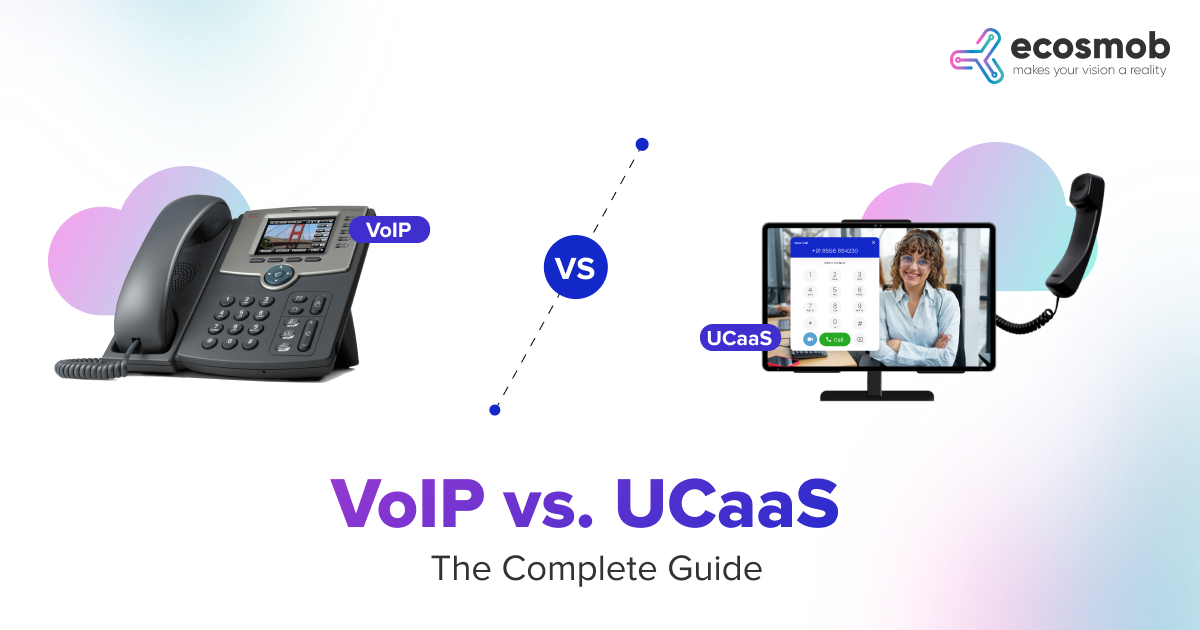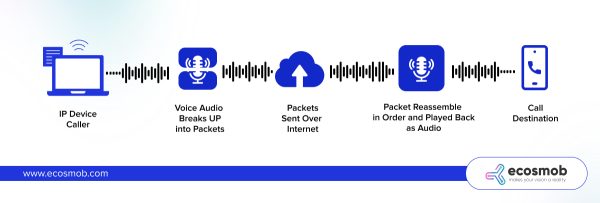Quick Summary: VoIP and UCaaS both utilize internet protocols for communication, offering cost-effective, scalable, and flexible solutions. UCaaS includes comprehensive collaboration tools beyond VoIP.
In modern telecommunications, businesses constantly seek efficient, cost-effective solutions to streamline operations. The digital transformation of communication systems has brought numerous innovations, with Voice over Internet Protocol (VoIP) and Unified Communications as a Service (UCaaS) at the forefront. These technologies have fundamentally changed how organizations communicate, providing numerous features that cater to different needs and preferences. VoIP unified communications and UCaaS have become essential for modern businesses, enabling seamless Communication and collaboration. However, understanding each technology’s advantages and specific use cases is crucial for making informed decisions. This comprehensive guide will explore into the intricacies of VoIP and UCaaS, providing a detailed comparison, exploring their use cases, and outlining the benefits of each solution.
Start using VoIP and save up to 60% on international calls.
Overview of VoIP vs. UCaaS
VoIP is widely recognized for its cost-effectiveness, scalability, and integration with other communication tools. As a result, businesses can enjoy significant savings on telephony expenses, benefit from scalable solutions that grow with their needs, and enhance their communication infrastructure with advanced features.
On the other hand, Unified Communications as a Service (UCaaS) is a cloud-delivered model that incorporates collaboration tools into a single platform. UCaaS encompasses VoIP unified communications but includes features like video conferencing, instant messaging, and more. It offers a holistic approach to business communications, providing a seamless and integrated user experience. UCaaS eliminates the need for disparate systems by centralizing all communication services, thus enhancing productivity and collaboration across the organization.
What is VoIP?
Voice over Internet Protocol (VoIP), is a technology that allows voice conversations to take place over the Internet compared to regular phone lines. Digital data packets containing voice signals are converted and sent over IP networks. This technology has revolutionized communication by offering cost-effective and flexible calling options, making it a popular choice for businesses and individuals. This technology has revolutionized communication by offering cost-effective and flexible calling options, making it a popular choice for businesses and individuals.
Key Features of VoIP
VoIP offers a range of features that have revolutionized how businesses and individuals communicate. Here are some key features that make VoIP a compelling choice:
- Cost Savings: One of VoIP’s most significant advantages is its potential for cost savings. Traditional phone systems often incur high costs for long-distance and international calls. VoIP dramatically reduces these expenses by using the internet for call transmission. Many VoIP providers offer competitive pricing plans that include unlimited local and long-distance calling, further enhancing savings.
- Flexibility and Mobility: VoIP offers unmatched versatility. Users can make and take calls from any location as long as they have an internet connection. This mobility supports remote work and ensures that employees can stay connected in the office, at home, or on the go. VoIP applications can be installed on various devices, including smartphones, tablets, and laptops, enabling seamless communication across multiple platforms.
- Scalability: Scalability is another key feature of VoIP. Traditional phone systems require additional hardware and significant setup to add new lines. In contrast, VoIP systems can quickly scale up or down to match business needs without significant infrastructure changes. Adding a new user or line can often be accomplished through a simple software update, making it an ideal solution for growing businesses.
- Advanced Call Management Features: VoIP systems have various advanced call management features that improve productivity and efficiency. These features include:
-
-
- Call Forwarding: Redirects calls to another number or device.
- Voicemail to Email: Sends voicemail messages directly to your email inbox.
- Auto Attendant: An automated system that answers calls and directs them to the appropriate department or person.
- Call Recording: Records calls for training, quality assurance, or compliance purposes.
- Conference Calling: Facilitates multi-party calls, enabling effective team communication.
-
- Integration with Other Systems: VoIP systems can seamlessly incorporate with other business applications and systems, such as Customer Relationship Management (CRM) software. This integration allows for streamlined workflows and improved data management, as calls can be logged, monitored, and analyzed alongside other business activities.
- Enhanced Audio Quality: Advancements in VoIP technology have significantly improved call quality. High-definition (HD) voice and advanced compression algorithms ensure clear and crisp audio, often surpassing the quality of traditional phone lines.
- Security: Modern VoIP systems incorporate robust security measures to protect against potential threats. Encryption, secure protocols, and regular updates help safeguard communication data from eavesdropping, hacking, and other cyber threats.
- Global Reach: VoIP enables businesses to establish a global presence without needing physical offices in different locations. By obtaining local numbers from various regions, companies can provide customers with a local contact point, enhancing their accessibility and customer service.
VoIP provides an extensive feature set that meets the changing demands of modern communication. Its low cost, high functionality, scalability, and flexibility makes it a powerful tool for companies looking to streamline their communication systems.
What is UCaaS?
Unified Communications as a Service (UCaaS) is a cloud-delivered service model that provides a variety of communication and collaboration applications and services. UCaaS integrates multiple communication tools into a single platform, such as voice, video, messaging, and conferencing. This holistic approach enhances productivity and streamlines communication within organizations.
Key Features of UCaaS
UCaaS offers a plethora of capabilities that boost productivity and simplify corporate operations by combining many communication and collaboration technologies into a single, cloud-based platform. Here are the key features of UCaaS:
- Integrated Communication Tools: UCaaS combines multiple communication modalities into one platform, including voice, video, messaging, and email. This integration ensures that communication channels are seamlessly connected, facilitating smooth and efficient communication within the organization.
- Video Conferencing: High-quality video conferencing is a cornerstone of UCaaS. It allows teams to hold virtual meetings, webinars, and training sessions, supporting remote work and enhancing collaboration. Features often include screen sharing, virtual backgrounds, and recording capabilities.
- Team Messaging and Collaboration: UCaaS platforms provide robust team messaging tools that support real-time text communication, file sharing, and collaborative workspaces. These tools often include features like group chats, direct messaging, and threaded conversations, helping teams stay connected and work together more effectively.
- Mobility and Device Independence: UCaaS solutions are designed to be accessible from any device, comprising laptops, smartphones, desktops, and tablets. This device independence ensures that users can stay connected and access communication tools regardless of location, supporting remote and mobile work environments.
- Call Management Features: UCaaS platforms offer a variety of advanced call management features, such as:
-
-
- Auto Attendant: An automated system that answers incoming calls and routes them to the right department or individual.
- Call Queues: Manages incoming calls by placing them in a queue and routing them to available agents.
- Voicemail to Email: Sends voicemail messages directly to the user’s email inbox.
- Call Recording: Records calls for training, quality assurance, or compliance purposes.
- Find Me/Follow Me: Routes calls to multiple devices or numbers to ensure that users can be reached wherever they are.
-
- Collaboration Tools: UCaaS platforms often include tools such as document sharing, project management, and virtual whiteboards. These tools facilitate teamwork and help streamline project workflows by providing a centralized space for collaborative activities.
- Security and Compliance: Security is a major aspect of UCaaS. These platforms typically incorporate robust security measures, such as encryption, secure protocols, and compliance with industry standards (e.g., HIPAA, GDPR). These features help protect sensitive communication data and ensure compliance with regulatory requirements.
- Analytics and Reporting: UCaaS platforms provide comprehensive analytics and reporting tools that provide insights into communication usage and performance. Businesses can monitor call volume, response times, and user engagement, helping them make data-driven decisions to improve communication strategies.
- Third-Party Integrations: UCaaS platforms often support integrations with other business applications, such as productivity suites, Customer Relationship Management (CRM) systems, and helpdesk software. These integrations enhance workflow efficiency and ensure seamless data exchange between different tools.
UCaaS provides a comprehensive, integrated solution that enhances organizational communication and collaboration. Its numerous characteristics assure flexibility and scalability, enhance productivity, support a range of communication demands, and make it a vital tool for companies of all sizes.
What is the Difference Between UCaaS and VoIP?
While UCaaS (Unified Communications as a Service) and VoIP (Voice over Internet Protocol) leverage Internet protocols for communication, they differ significantly in scope, functionality, and the range of services they offer. Here’s a detailed comparison:
1. Scope of Services
- VoIP: This service primarily focuses on voice communication, offering features like call forwarding, voicemail, and caller ID. VoIP replaces traditional phone lines with internet-based calling, upgrading it to conventional telephony.
- UCaaS: Encompasses VoIP unified communications but extends its capabilities to include various communication, such as video conferencing, instant messaging, file sharing, and team collaboration. It is a comprehensive communication solution integrating multiple services into a single platform.
2. Integration
- VoIP: This can integrate with other software applications, but these integrations are typically limited to voice-related features. While VoIP systems can work alongside other tools, they often need to provide a unified experience.
- UCaaS: It provides a unified platform that seamlessly integrates various communication tools. This cohesive integration enhances user experience by offering a single interface for all communication needs, thus improving workflow efficiency.
3. Deployment
- VoIP: It can be deployed on-premises or through a hosted service, providing flexibility in its implementation. It allows businesses to choose the best deployment method based on their infrastructure and specific requirements.
- UCaaS: Exclusively cloud-based, which offers greater flexibility and easier access to updates and new features. Being cloud-based ensures that users can access the latest functionalities without extensive maintenance.
4. User Experience
- VoIP: Solutions may require users to switch between different applications for voice, messaging, and collaboration, which can be cumbersome and time-consuming. It can result to a fragmented user experience.
- UCaaS: Offers a single interface for all communication needs, significantly improving usability and efficiency. This unified approach simplifies communication, enhancing productivity and reducing the user learning curve.
5. Cost
- VoIP: It is generally more cost-effective for businesses primarily needing voice communication. It provides significant savings on long-distance and international calls compared to traditional phone systems. The cost structure typically involves a monthly subscription fee, which covers call services and additional features like voicemail, caller ID, and call forwarding. There are usually minimal upfront costs since VoIP uses existing internet infrastructure, and businesses can avoid the hefty investments associated with traditional telephony hardware.
- UCaaS: Due to its comprehensive feature set, UCaaS can be more expensive than VoIP. The cost includes a subscription fee, and while the upfront costs might be higher, the value provided by integrating multiple services justifies the expense. UCaaS can also reduce the total cost of ownership by eliminating the need for multiple, separate communication systems and reducing IT management overhead.
6. Scalability
- VoIP: Highly scalable, making it suitable for businesses of all sizes. Adding or removing lines is straightforward and does not require significant infrastructure changes. This scalability allows companies to adjust their communication capabilities as their needs evolve, whether expanding, downsizing, or experiencing seasonal fluctuations in call volume.
- UCaaS: UCaaS offers even greater scalability. As a cloud-based solution, UCaaS allows businesses to quickly scale up/down based on their needs without worrying about physical infrastructure limitations. New users and services are added quickly, and updates are deployed automatically, ensuring that the system can grow with the companies and adapt to changing communication requirements. It makes UCaaS ideal for organizations experiencing rapid growth or those with fluctuating workforce sizes, such as seasonal businesses.
7. Flexibility
- VoIP: VoIP provides flexibility by allowing users to make and take calls from various devices, including desk phones, computers, and mobile devices. This flexibility ensures that staff members can stay connected regardless of location, which is particularly beneficial for remote or mobile workers. Additionally, VoIP services can be customized to include various features tailored to the business’s specific needs.
- UCaaS: Due to its cloud-based nature, UCaaS offers superior flexibility. It offers access to a suite of communication tools with an internet connection from any location. It is particularly advantageous for businesses with remote/distributed teams, as it makes sure that all employees have consistent access to communication tools. The flexibility of UCaaS also extends to its ability to integrate with other business applications, improving workflows and productivity across the organization.
8. Use Case
- VoIP: VoIP is ideal for businesses requiring reliable, cost-effective voice communication solutions. It suits organizations looking to replace traditional phone systems with a more modern, flexible, and scalable option. VoIP is also an excellent fit for small to medium-sized businesses that need basic communication features and want to minimize capital expenditure.
- UCaaS is best suited for businesses needing a comprehensive communication solution. It is particularly beneficial for organizations with remote or distributed teams that require seamless access to communication tools from any location. UCaaS is also ideal for businesses looking to improve collaboration and productivity through integrated platforms, future-proof their communication infrastructure with scalable and flexible solutions, and streamline IT management by reducing the complexity of maintaining multiple systems.
While VoIP is an excellent choice for businesses focusing primarily on voice communication, UCaaS offers a more holistic approach by integrating various communication tools into a single, cloud-based platform. The choice between VoIP and UCaaS ultimately depends on the business’s specific needs, size, and objectives.
Comparison between VoIP vs. UCaaS
Here is a difference between VoIP and UCaaS:
| Feature | VoIP | UCaaS |
| Scope of Services | Voice communication, voicemail, caller ID | VoIP, video conferencing, messaging, file sharing, team collaboration |
| Integration | Limited to voice-related features | Seamless integration of multiple communication tools |
| Deployment | On-premises or hosted service | Cloud-based |
| User Experience | Fragmented may require multiple applications | Unified interface for all communication needs |
| Cost | Generally more cost-effective | Can be more expensive but offers greater value |
| Scalability | Scalable, easy to add/remove lines | Highly scalable, suitable for businesses of all sizes |
| Flexibility | Flexible deployment options | Flexible access from any location, easy updates |
| Use Case | Ideal for basic voice communication needs | Best for comprehensive communication and collaboration needs |
Similarities Between VoIP and UCaaS Solutions
VoIP and UCaaS are both modern communication technologies that utilize the Internet to transmit data. While they have distinct differences, they also share several similarities, making them both valuable options for businesses looking to improve their communication infrastructure. Here’s a detailed explanation of the similarities between VoIP and UCaaS:
- Internet-Based Communication: VoIP and UCaaS use Internet protocols to transmit voice and data. This means they rely on an internet connection, which can reduce communication costs, especially for long-distance calls.
- Cost Savings: Both technologies offer cost savings compared to traditional telephony systems. By using the Internet for Communication, businesses can avoid the high costs, including setup fees, long-distance charges, and maintenance costs.
- Scalability: VoIP and UCaaS solutions are both scalable, allowing businesses to quickly add/remove users as needed. This scalability mainly benefits growing companies or those with fluctuating communication needs.
- Flexibility: VoIP and UCaaS provide flexibility regarding device usage. This flexibility supports remote work and mobile employees, ensuring they stay connected regardless of location.
- Advanced Features: Both solutions offer advanced features that enhance Communication and productivity. Common features include voicemail, call forwarding, auto-attendant, and conferencing, which can be customized to meet a business’s specific needs.
- Integration Capabilities: VoIP and UCaaS solutions can integrate with other business applications. This integration helps streamline workflows and improve overall efficiency.
- Improved Communication Quality: Both technologies can provide high-quality voice communication, often better than traditional phone lines. Advanced codecs and Quality of Service (QoS) settings help ensure precise and reliable Communication.
- Easy Management: Both VoIP and UCaaS are typically managed through a web-based interface, allowing administrators to configure and monitor the system easily. This centralized management simplifies IT tasks and reduces the need for specialized telephony expertise.
|
Similarity |
VoIP |
UCaaS |
| Internet-Based Communication | Uses internet protocols for voice communication | Uses internet protocols for voice, video, messaging, and collaboration |
| Cost Savings | Reduces costs compared to traditional phone systems | Reduces costs by consolidating communication tools into one platform |
| Scalability | Easily adds or removes users as needed | Easily scales up or down to meet business needs |
| Flexibility | Supports communication on multiple devices | Supports communication and collaboration on multiple devices |
| Advanced Features | Offers features like voicemail, call forwarding, conferencing, video meetings, messaging, and collaboration tools | Offers features like voicemail, call forwarding, conferencing, video meetings, messaging, and collaboration tools |
| Integration Capabilities | Can integrate with CRM, email, and other applications | Provides seamless integration with CRM, email, and other business applications |
| Improved Communication Quality | Ensures high-quality voice communication | Ensures high-quality voice, video, and data communication |
| Easy Management | Managed through a web-based interface | Managed through a web-based interface with comprehensive admin controls |
The Benefits of UCaaS Over VoIP
UCaaS offers a more integrated and comprehensive communication solution. This integration leads to improved productivity and streamlined workflows, as all communication tools are accessible from a single platform. Additionally, UCaaS provides greater scalability and flexibility, allowing companies to quickly adapt to changing needs from anywhere, which is particularly beneficial for remote and distributed teams.
1. Comprehensive Communication
VoIP: VoIP focuses primarily on voice communication, providing features such as voicemail, call forwarding, caller ID, and conferencing. While these features are essential for business telephony, they cover only some of the full spectrum of modern communication needs.
UCaaS: UCaaS integrates a wide array of communication tools into a single platform, encompassing not only VoIP but also video conferencing, instant messaging, presence information, file sharing, and team collaboration tools. This comprehensive approach removes the need for multiple disparate systems, simplifying communication and enhancing productivity. Employees can switch seamlessly between voice calls, video meetings, and team chats within the same platform, improving workflow efficiency and user experience.
2. Enhanced Collaboration
VoIP: VoIP provides reliable voice communication, but collaboration often requires additional tools and platforms. It can lead to fragmented communication and reduced efficiency, as employees might need to juggle multiple applications for different tasks.
UCaaS: With UCaaS, collaboration is significantly enhanced through integrated tools such as video conferencing, team messaging, and shared workspaces. Teams can collaborate in sharing documents, real time, and manage projects more effectively. Features like presence information and instant messaging allow quick and easy communication, fostering a more collaborative work environment. It is especially beneficial for remote or distributed teams, where seamless communication tools are crucial for maintaining productivity.
3. Scalability and Flexibility
VoIP: VoIP is inherently scalable and a flexible solution for companies of various sizes and needs.
UCaaS: UCaaS takes scalability and flexibility to the next level. Whether you’re adding new employees, opening new locations, or adjusting to seasonal fluctuations, UCaaS can adapt quickly and efficiently. Additionally, the cloud-based nature of UCaaS allows easy access to services from anywhere, making it ideal for businesses with remote or mobile workforces. Updates and new features are automatically, ensuring that users have access to the latest technology without needing manual upgrades or extensive IT intervention.
4. Cost Efficiency
VoIP: VoIP offers cost savings and primarily addresses voice communication costs and may require additional expenditures for other communication tools.
UCaaS: While UCaaS may have a higher upfront cost due to its comprehensive feature set, it often results in greater overall cost efficiency. By consolidating multiple communication services into a single platform, UCaaS reduces the need for separate systems and associated maintenance costs. This integration lowers the total cost of ownership and simplifies IT management. Furthermore, UCaaS can help businesses avoid the capital expenses associated with on-premises infrastructure, as it leverages a subscription-based model that covers all communication needs.
5. Improved User Experience
VoIP: VoIP solutions can sometimes require users to switch between different applications for voice and messaging, leading to a more efficient user experience.
UCaaS: UCaaS provides a unified interface for all communication needs, significantly improving usability and efficiency. The improved user experience also leads to higher adoption rates and employee satisfaction, further enhancing organizational efficiency. The benefits of UCaaS over VoIP include a broader range of communication tools, enhanced collaboration, greater scalability and flexibility, cost efficiency, and an improved user experience.
VoIP vs. UCaaS: Which one is Right For You?
Choosing between VoIP and UCaaS depends on your specific business needs, goals, and resources. Here’s a detailed breakdown to help you decide which communication solution is right for your organization.
When to Use VoIP
VoIP is an excellent choice for companies that:
- Primarily Need Reliable Voice Communication: VoIP is ideal if your business requires a reliable and cost-effective voice communication solution without extensive collaboration tools. It provides the essential telephony features necessary for day-to-day business operations at a lower cost than traditional phone systems.
- Are Looking to Replace Traditional Phone Systems: VoIP is perfect for businesses seeking to replace or upgrade their traditional phone systems. It offers more flexibility and scalability, allowing easy addition or removal of lines as the company grows or changes.
- Budget constraints include expenditure for small to medium-sized businesses with limited expenses and for small to medium-sized companies with limited budgets. Its lower operational costs and the ability to leverage existing internet infrastructure make it a budget-friendly option.
- Need Basic Communication Features: If your business communication needs are primarily focused on voice calls with additional features like call forwarding, voicemail, and caller ID, VoIP provides these functionalities without the complexity and cost of more comprehensive systems.
When to Use UCaaS?
UCaaS is ideal for businesses that:
- Require Comprehensive Communication Solutions: If your business needs a unified communication platform, UCaaS is the best choice. It provides an all-in-one solution that meets diverse communication needs.
- Distributed Teams: UCaaS have benefits for businesses with remote or distributed teams. Its cloud-based nature ensures seamless access to communication tools from any location, supporting effective collaboration regardless of geographical boundaries.
- Seek to Improve Collaboration and Productivity: UCaaS enhances collaboration through integrated tools like video conferencing, messaging, and shared workspaces. It fosters better teamwork and productivity, making it ideal for companies looking to streamline their communication processes.
- Want to Future-Proof Communication Infrastructure: UCaaS allows for quick and easy addition of services, ensuring that the communication infrastructure can grow with the business.
- Need to Streamline IT Management: UCaaS simplifies IT management by consolidating multiple communication tools into a single platform. It reduces the complexity of maintaining separate systems and lowers the overall IT burden.
Top UCaaS Providers
Several providers dominate the UCaaS market, each providing specifications and capabilities to meet diverse business needs. Here are some of the top UCaaS providers:
- RingCentral: Known for its robust feature set, including VoIP, video conferencing, team messaging, and integrations with popular business applications. RingCentral offers a comprehensive UCaaS solution that caters to businesses of all sizes.
- Zoom: Initially famous for video conferencing, Zoom has expanded its UCaaS offerings to include VoIP and messaging. Its user-friendly interface makes it a choice for businesses seeking an integrated communication platform.
- Microsoft Teams: As part of the Microsoft 365 suite, Teams integrates seamlessly with other Microsoft applications, providing a comprehensive communication and collaboration platform. Teams are particularly beneficial for organizations already using Microsoft products.
- Cisco Webex: Offers a range of communication tools, including VoIP, video conferencing, team collaboration, and advanced security features. It is known for its reliability and security, making it suitable for companies with security requirements.
- 8×8: Provides a complete UCaaS solution with voice, video, messaging, and contact center capabilities. 8×8’s diverse feature set and global reach make it a versatile option for businesses looking to enhance their communication infrastructure.
Making the Final Decision
VoIP and UCaaS are potent tools that can significantly enhance business communication. VoIP is perfect for businesses that need reliable, cost-effective voice communication and basic telephony features. In contrast, UCaaS offers more integrated tools, making it the perfect choice for businesses looking to enhance productivity, support remote teams, and streamline IT management. By understanding Ecosmob Technologies’ benefits and use cases, you can make an informed decision that best aligns with your communication needs.
Get started with UCaaS and see a boost in team productivity. Don’t miss out!
VoIP vs. UCaaS FAQs
What is the primary difference between VoIP and UCaaS?
VoIP focuses primarily on voice communication over the Internet, while UCaaS integrates various communication tools, such as voice, video, messaging, and collaboration, into a single platform.
Are there cost differences between VoIP and UCaaS?
VoIP is generally more cost-effective for essential voice communication, while UCaaS can be more expensive due to its comprehensive feature set. However, UCaaS can reduce overall costs by eliminating the need for multiple separate communication systems.
Which solution is better for remote work: VoIP or UCaaS?
UCaaS is better suited for remote work as it offers a unified voice, video, messaging, and collaboration platform accessible from any location with an internet connection.
How does UCaaS improve collaboration compared to VoIP?
UCaaS includes integrated collaboration tools such as video conferencing, instant messaging, and shared workspaces, which enhance teamwork and productivity. VoIP typically requires additional platforms for these functionalities.
How do UCaaS providers ensure service reliability?
UCaaS providers typically offer high availability, redundancy, and disaster recovery features to ensure reliable service. These measures help minimize downtime and ensure continuous communication capabilities.
















